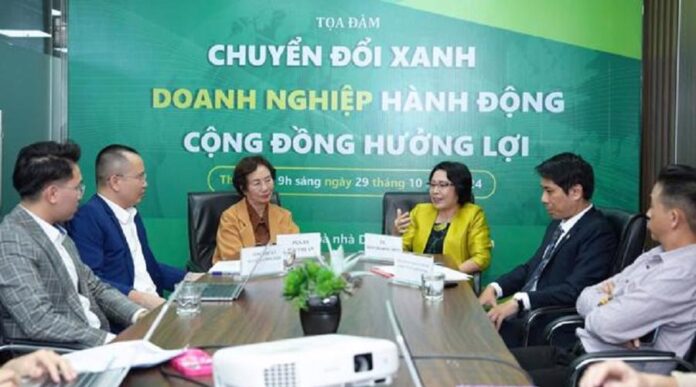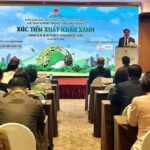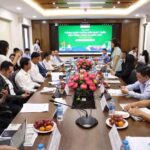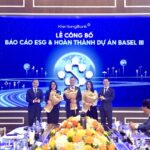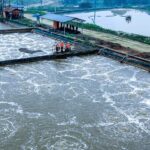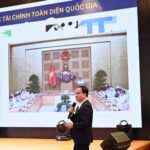According to the Ministry of Industry and Trade, the consumption demand for green products in Vietnam has grown by an average of 15% annually in the period of 2021 – 2023. Notably, 72% of Vietnamese consumers are willing to pay more for environmentally friendly products, indicating a growing interest in environmental protection.
At the talk show “Green Transition: Business Action, Community Benefits” held by Marketing & Family in collaboration with Acecook Vietnam Joint Stock Company on October 29, the opinions unanimously stated that the green transition has become an inevitable trend.
CAN GREEN DEVELOPMENT SUSTAIN PROFITS?
However, this poses quite a few challenges for manufacturing enterprises. It requires enterprises not only to change consumers’ perception but also to meet the increasing demands while sustaining profits.
From a business perspective, Mr. Pham Trung Thanh, Head of External Relations of Acecook, shared that the goal of sustainable development is not only for Acecook Vietnam but also the orientation of the company in Japan.
Currently, the enterprise is making efforts to implement many measures and process improvements to serve the green transition in production, such as increasing the use of renewable energy, reducing plastic waste through the activity of converting instant noodle cups from plastic cups to paper cups, and switching from coal-fired boilers to biomass boilers…
However, the biggest difficulty for enterprises in implementing the green transition is investment cost. The cost of investing in infrastructure and packaging conversion is not small. “This is a difficult problem for manufacturing enterprises, which have to achieve the goal of sustainable development, provide quality products, and keep prices reasonable,” Mr. Thanh emphasized.
Another difficulty is the sustainable supply. Currently, there are very few units providing sustainable services or materials in the market, which leads to high prices for these services and materials.
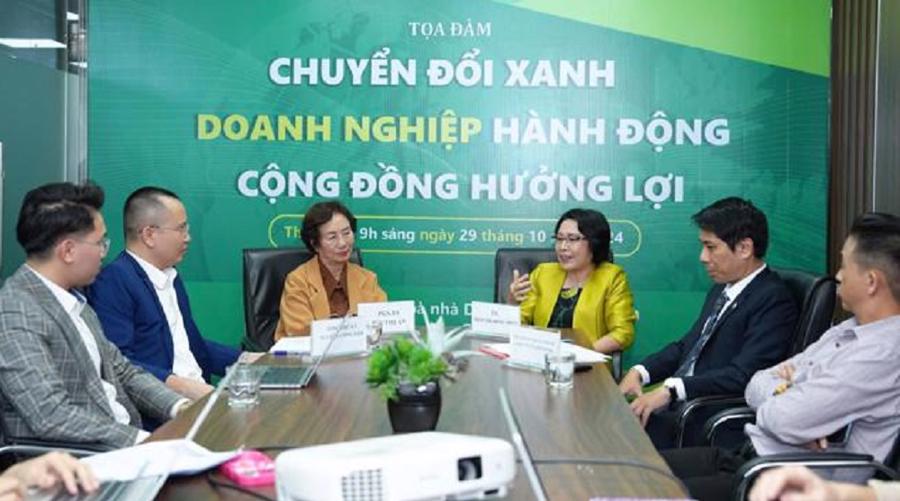
Another factor is that enterprises themselves, despite their desire to go green, lack knowledge about this issue. Enterprises have to learn and update knowledge from various sources, evaluate and adjust on the go, and improve day by day.
Despite the difficulties, Acecook remains optimistic, believing that promoting production and sustainable development brings many benefits to enterprises. In addition to social benefits such as environmental protection and emission reduction, enterprises also benefit in many other aspects. For example, operating rooftop solar power systems helps enterprises optimize and reduce long-term costs; improving production efficiency and reducing resource waste.
Moreover, the green transition helps enterprises be ready to meet the requirements and fluctuations of the market, as more and more exporting countries have stricter sustainable standards for products. This also opens up potential markets and cooperation opportunities for enterprises that have been doing well in the green transition.
ENTERPRISES NEED INCENTIVES TO TRANSITION
Sharing about the policies to support enterprises in the green transition process, Ms. Tran Thi Hong Minh, Director of the Central Institute for Economic Management (CIEM), said that we still lack strong policies to support green development. The existing policies are not really synchronized, leading to a lack of large enough incentives for enterprises.
For example, the National Program on Sustainable Production and Consumption has taken the first steps, but there is still a lack of specific measures to encourage enterprises to invest in green products.
Therefore, Ms. Minh proposed policies related to tax, credit, finance, human resources, etc., to support enterprises that innovate and develop environmentally friendly products.
In addition, there needs to be a clearer legal framework for businesses to easily access and implement sustainability commitments. On the other hand, training programs and workshops to raise awareness about green consumption for businesses and consumers are also important.
“State policies not only create incentives for businesses but also promote a strong shift in consumers’ habits, towards a more sustainable future,” Ms. Minh affirmed.
From a business perspective, Acecook Vietnam representative said that first and foremost for the development of green consumption is to promote campaigns to raise community awareness of the benefits of green consumption and environmental protection.
Along with that, there should be standards for green products and incentives for these products when they are circulated in the market to increase competitiveness among enterprises and create opportunities for more consumers to access, use, and support green products.
Supporting enterprises in researching and developing technology to move towards a green transition is also necessary. Investing in green infrastructure should also be noted to make the transition consistent from top to bottom, such as investing in facilities, means of collecting and recycling waste, encouraging the model of green distribution and logistics, encouraging the use of green means of transportation such as green buses, electric cars, etc. At the same time, supporting green transition initiatives such as recycling, waste treatment, encouraging consumers and enterprises to participate and contribute.
The Green Port Transition: Sailing Towards Sustainability
Vietnam is lagging behind in the green transition, and there’s a lot of ground to cover. The issue at hand is the need to accelerate this process; otherwise, the country risks missing out on development opportunities and even falling behind as no “green ship” wants to dock at a “non-green port.”
KienlongBank: Leading the Way with Concurrent Basel III & ESG Initiatives
“With the synchronized implementation of both the Basel III and ESG projects, KienlongBank is demonstrating its strong commitment to enhancing its risk management capabilities and resilience against unforeseen fluctuations. The bank is also actively promoting its development towards sustainability, adhering to international and Vietnamese standards in environmental, social, and governance practices.”
Masan High-Tech Materials: Honored as a “Sustainable Enterprise” for Seven Consecutive Years
On November 29, Masan High-Tech Materials, a leading provider of advanced materials, was once again recognized for its sustainability efforts, securing a place in the prestigious Top 100 Sustainable Businesses in Vietnam (CSI 100). This acknowledgment underscores the company’s unwavering commitment to environmental stewardship, social responsibility, and strong governance practices.
The Challenge of Advancing Financial Inclusion in Vietnam
Many Vietnamese citizens without smartphones, a lack of policies for microfinance development, and limited product and service provisions pose challenges for financial inclusion in Vietnam.

